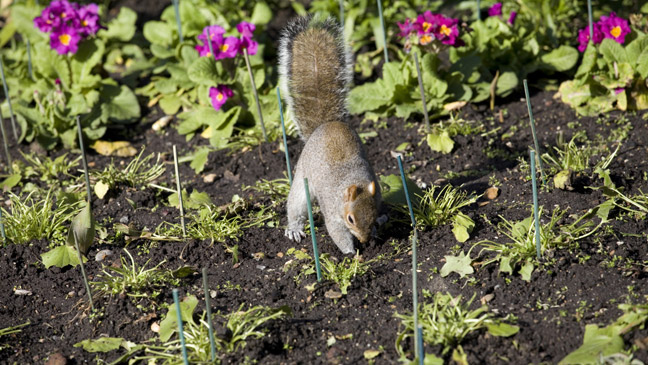The planting season for daffodils, tulips and many of next Spring’s delights has been going on for several months. Tubs and planters are prepared; beds are full and ready for the frosts of winter.
But wait a minute, who or what has been digging them up again? That pesky squirrel, or more precisely a whole family of squirrels. If you own a garden, wherever it is, you have squirrels. Even if you don’t have trees.
The first year I planted bulbs in the tubs and boxes, I spent a fortune on the bulbs and the correct compost. By the time I had finished all six of them they were neat and set for the winter snows, a nice flat top with the soil all level.
Next morning they were still neat but something had obviously been trying to dig. That cursed cat next door, I imagined. Whenever I saw him, I shooed him away. Then one morning a week or so later I saw a family of squirrels playing and gambolling around my lawns. Ah, they’re lovely, I thought.
Not So Lovely
I could not have been more wrong. Over the next weeks and months they caused havoc first with the tubs and planters, then as plants began to shoot in the spring by nipping the young, fresh tips of the plants.
 They fair ruined the garden I had so lovingly prepared in the autumn and early winter, ready for a colourful spring and summer. I wasn’t alone as the neighbour also complained about the squirrels.
They fair ruined the garden I had so lovingly prepared in the autumn and early winter, ready for a colourful spring and summer. I wasn’t alone as the neighbour also complained about the squirrels.
Yes, we have a number of trees but the squirrels didn’t seem to be coming from them, they were entering our gardens from adjacent woodlands and other areas with trees and shrubs.
We researched them: The Royal Horticultural Society website was particularly useful. They can attack a wide range of ornamental plants, fruits and vegetables, it said. Particularly at risk are tulip bulbs, crocus corms, sweetcorn, strawberries, apples, pears, sunflower seed heads and the buds of camellias and magnolias. Trees, including sycamore, maples, ash and beech, can be badly damaged or even killed by bark stripping.
It was not the best of news because the list of plants being shredded included many that I was growing.
Eating Everything

Apart from eating everything from fruits to seeds they raid bird feeders and take eggs from birds’ nests, damage lawns by burying or digging up winter food stores and gnaw on plastic, such as hosepipes and plastic netting.
I was getting frantic. Was there nothing I could do to stop these little blighters?
According to the RHS website: “It is not possible to stop squirrels from entering a garden, although there are steps that can be taken to reduce the damage they cause. Additional information on living with grey squirrels can be downloaded from the RSPCA.”
Thanks a lot, I thought.
Fighting back
 I was now getting really angry and was willing to hire a howitzer to blast every damn squirrel to Kingdom come. So I began to fight back. First with netting over the tubs.
I was now getting really angry and was willing to hire a howitzer to blast every damn squirrel to Kingdom come. So I began to fight back. First with netting over the tubs.
Then I figured that the netting could also protect fruits and shrubs whenever the squirrels show an interest in them.
Wire netting is best for permanent structures such as fruit cages, as squirrels can quite easily bite through plastic.
It is permissible to control grey squirrels by shooting or trapping, provided it is done humanely but shooting is not often feasible in gardens for legal and safety reasons. Then I picked up a tip from an old allotment gardener.
“They don’t like chilli,” he rasped. I thought he was joking. But no, a small sprinkle of chilli powder around favoured plants and the squirrels search for feeding pastures anew.
And that’s what I was out in the garden sprinkling last weekend. I had to tell the grandkids it was an old Halloween ritual in Ireland as the leprechauns love the taste of chilli in the garden. Well, I couldn’t tell them it was to get rid of the squirrels, their furry favourite.
by Bob Graham
The post Gardening: Coping With Pesky Squirrels appeared first on Felix Magazine.
No comments:
Post a Comment